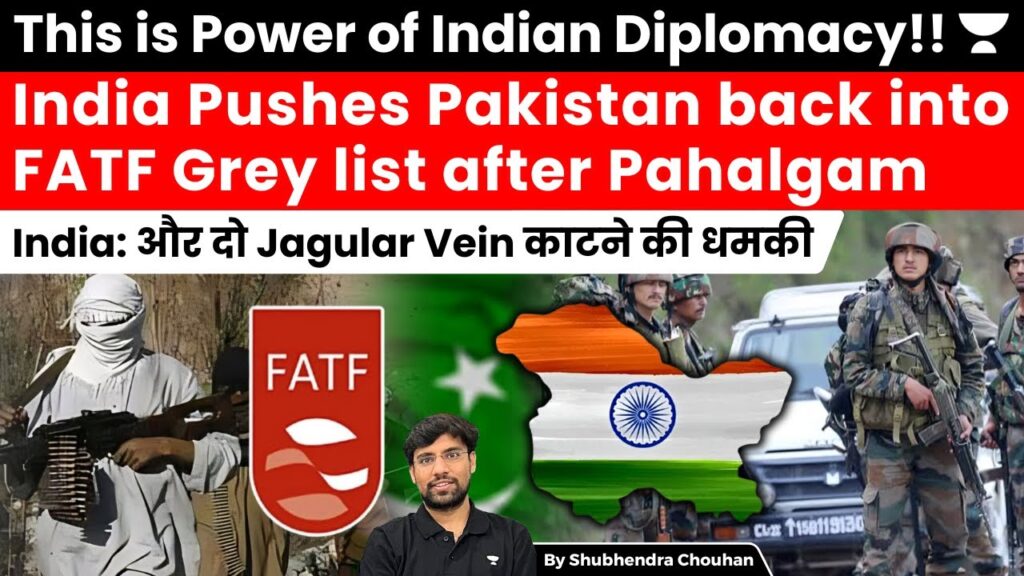By K Raveendran
India is intensifying its diplomatic offensive against Pakistan, with efforts now underway to push for Islamabad’s re-listing on the Financial Action Task Force (FATF) grey list. This renewed push, backed by an unusually strong expression of support from the Trump-led U.S. administration, marks a strategic escalation by New Delhi to hold Pakistan accountable for its continued complicity in cross-border terrorism.
The FATF grey list—formally known as jurisdictions under increased monitoring—had previously included Pakistan from 2018 to 2022, subjecting the country to intense scrutiny over money laundering and terror financing channels. That four-year period saw Islamabad scrambling to implement a raft of financial reforms under international pressure, and it significantly hindered Pakistan’s access to foreign investments, loans, and development assistance. The delisting in 2022 had been a diplomatic and economic breakthrough for the embattled South Asian nation, offering a lifeline to its already floundering economy and enabling renewed engagement with global financial institutions. India now appears determined to reverse that gain.
The push to bring Pakistan back into the FATF’s crosshairs gained urgency after the Pahalgam terror attack. Though Islamabad has denied any involvement, Indian officials have furnished fresh intelligence to key FATF member states, including details of financial trails that allegedly connect the perpetrators of the attack to Pakistan-based funders. According to sources within India’s Ministry of External Affairs, the dossier includes satellite imagery, intercepted communications, and transaction records indicating cross-border flows of money tied to extremist activities in Jammu and Kashmir. The objective is clear: to demonstrate that Pakistan has failed to uphold its commitments to counterterror financing, thus justifying a return to the FATF’s increased monitoring regime.
The effort is likely to gain momentum thanks to renewed geopolitical alignments. In a notable departure from recent U.S. ambiguity on South Asia, President Donald Trump has publicly backed India’s right to “defend itself against terrorism in all forms” following the Pahalgam incident.
India’s current lobbying at FATF headquarters in Paris is reportedly being conducted in coordination with France, Germany, and the United States—countries that have previously expressed frustration over Pakistan’s half-hearted implementation of terror financing reforms. Indian diplomats are said to be building a case that Pakistan’s apparent relapse into enabling or overlooking terror financing activities represents not just a regional threat, but a global one, especially in light of concerns over the Taliban’s resurgence in Afghanistan and the growing instability across the broader Middle East. FATF’s next plenary meeting is scheduled for June and sources suggest that India is working against that timeline to ensure the issue of Pakistan’s compliance status is placed high on the agenda.
This strategy comes at a particularly vulnerable time for Pakistan, whose economy is teetering under the weight of inflation, currency devaluation, and dwindling foreign reserves. The country’s current standby arrangement with the International Monetary Fund expires in mid-2025, and negotiations for a fresh bailout are expected to be arduous. Any move to reinstate Pakistan on the FATF grey list would severely complicate these negotiations, likely resulting in tougher loan conditions or delays in disbursement. Moreover, the reputational damage from being tagged as a jurisdiction with deficient anti-money laundering controls would deter private investors and further chill foreign direct investment at a time when Islamabad is desperate to attract capital. The implications are not merely financial—such a move could also stoke political instability in a nation already grappling with intense domestic upheaval and ongoing civil-military tensions.
Islamabad insists it has fully complied with all 34 action items mandated by FATF during its previous grey listing and continues to maintain a robust framework to combat money laundering and terror financing. Pakistani officials have also accused India of exploiting multilateral platforms to advance a “narrow geopolitical agenda” and warned that such actions could inflame regional tensions. Nevertheless, the diplomatic reality is that Pakistan’s credibility remains shaky in many quarters, particularly after past instances where it was found to be dragging its feet on implementing key reforms or failing to prosecute UN-designated terrorists operating on its soil.
As the FATF prepares for its mid-year session, the stakes are escalating. Even as some member states may be wary of politicising what is supposed to be a technocratic body, the precedent of 2018—when India successfully lobbied for Pakistan’s grey listing amid concerns over terror financing—suggests that political will and diplomatic coordination can outweigh technical ambiguity. With India’s economy surging and its global clout rising, it finds itself in a much stronger position today to influence multilateral forums than it did seven years ago. Moreover, the global security environment, shaped by the Israel-Gaza war, the Ukraine conflict, and resurgent jihadist activity in Africa and Asia, has put terrorism back at the forefront of international concern, creating a receptive climate for India’s arguments.
By targeting Pakistan’s financial credibility, India is not merely responding to a terror attack—it is seeking to reshape the strategic balance in South Asia. A weakened Pakistan, constrained by financial oversight and international suspicion, would have limited capacity to fund proxy groups. At the same time, India’s actions send a signal to other adversaries and regional players that it will pursue a multi-pronged response—including economic and diplomatic tools—to acts of terror emanating from across its borders. (IPA Service)

 Mahayuti Faces Strains as NCP Drive Sparks Discord
Mahayuti Faces Strains as NCP Drive Sparks Discord 